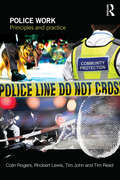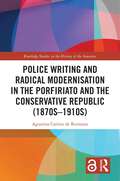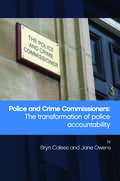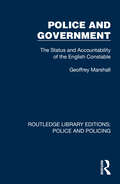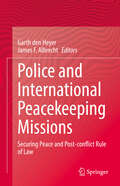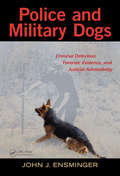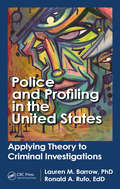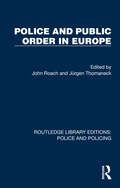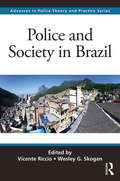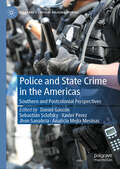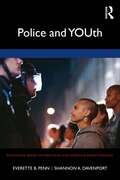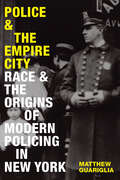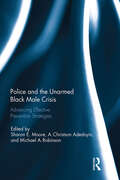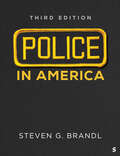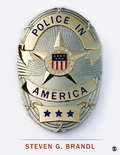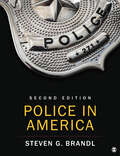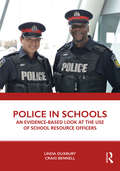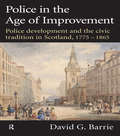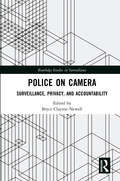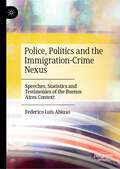- Table View
- List View
Police Work: Principles and Practice
by Tim Read Colin Rogers Rhobert Lewis Tim JohnThis book provides a highly readable account of police work. It builds upon Introduction to Police Work (Rogers and Lewis 2007) to provide a comprehensive, in depth and critical understanding of policing in today's diverse society. Police Work: Principles and Practice meets the need for an increasingly sophisticated and professional approach to training within the police, whether this is carried out within police forces themselves or within higher education institutions. Written in an accessible style by current and former police practitioners and a nationally recognized expert on the National Intelligence Model, this book focuses – in line with the government's agenda for workforce modernization – on three key areas of policing: community, investigation and intelligence. It introduces readers to many important areas through the use of definition boxes, scenario boxes highlighting good practice, points to note boxes, flowcharts and diagrams as well as a wide range of questions and exercises to help apply their knowledge to different situations and scenarios. This book will be essential reading for those on probationer training programmes and a valuable resource for students taking courses in policing and criminology more generally where an advanced level of understanding of the nature of police work is required.
Police Writing and Radical Modernisation in the Porfiriato and the Conservative Republic (Routledge Studies in the History of the Americas)
by Agustina Carrizo de ReimannThis book explores the process of modernisation during the Porfiriato and the Conservative republic from the perspective of one of its most erratic agents: the urban police.Taking a pragmalinguistic approach, this book examines police bureaucratic, journalistic, and literary writing practices that flourished in the wake of police professionalisation and in response to the demands of state expansion, urban order, and cultural disciplining. It outlines the precarious state of an institution that had to redefine itself in the face of change, as well as policemen’s attempts to enforce and imagine different modes of doing modern estate, society, and culture. Integrating classical sociological theories and perspectives from Latin American police studies with debates on republican modernity, this study argues for an understanding of fin-de-siècle modernisation as a process of radical transformation rather than a maladaptation to Western modernity or blunt heteronomy.With its comparative approach and theoretically informed analysis, this book will appeal to scholars exploring police formation in Argentina and Mexico, seeking new insights into this key period of national organisation, and questioning the premises underlying the interpretation of modernity. The transdisciplinary approach will be of interest to researchers of writing cultures and postgraduate students wishing to engage critically with the sources of history.
Police and Crime Commissioners: The Transformation of Police Accountability
by Bryn Caless Jane OwensPolice and Crime Commissioners (PCCs) are elected representatives whose role is to ensure that police forces in England and Wales are running effectively. Intended to bring a public voice to policing and hold the police to account, the holders of this controversial role also control budgets and strategic planning. Bryn Caless and Jane Owens obtained unprecedented access to the PCCs and their chief police officer teams and undertook confidential interviews with both sides. The results reveal the innermost workings of the PCCs’ relationships with the police, media, partners and public. The authors analyse the election process (in which PCCs polled the lowest local mandate ever) and consider the future of this politically-contested role. Examining the PCCs’ impact on policing, this fascinating book makes essential reading for Police Crime Commissioners, chief officers, police officers, police trainers and academics, students and researchers in criminology and policing.
Police and Government Relations
by Margaret E. Beare Tonita MurrayQuestions of police governance, accountability and independence have been subjected to thorough research before. That the issue still draws critical attention more than twenty years after the McDonald Commission of Inquiry into Certain Activities of the Royal Canadian Mounted Police suggests that understanding and a resolution to the issue still eludes us. Despite the modifications to police practice that the Charter of Rights and Freedoms has brought, there is still concern over the degree of independence the police exercise, and debate over where the line between legitimate government direction of the police and illegitimate political interference should be drawn.Police and Government Relations explores the question of police governance and independence from a number of different points of view. Editors Margaret E. Beare and Tonita Murray offer multi-disciplinary, comparative, and case-study methodologies written by scholars from law, political science, and criminology to illustrate the diversity of opinion that exists on the topic and to explore how the operating tension between police independence and democratic governance and accountability has played out, both in Canada and other countries. This book does not attempt to find final answers; its goal is to provide a framework for a continuing discussion that may lead to helpful and workable recommendations for the future. It serves as an academic and intellectual contribution to an important matter of public policy.
Police and Government: The Status and Accountability of the English Constable (Routledge Library Editions: Police and Policing)
by Geoffrey MarshallDespite the recent outcrop of controversy about the police and their accountability in the 1960s, there was no work dealing in detail with the problems discussed in this book. Originally published in 1965, it examines an unresolved issue, namely the position of the police in the constitutional framework and the extent to which police activities are subject to control by the electorate and their representatives in local authorities and in Parliament. The book attacks the well-known doctrine and the ‘independence’ of the police which had been widely accepted at the time. Topics dealt with include the legal status of constables and chief constables; pre- and post-war controversies about accountability for police operations; relations between local police authorities and the Home Secretary; the Royal Commission of 1962; the new Judges’ Rules for police questioning; and the Police Act, 1964. This work is an informed analysis of the problems being discussed at the time about police powers and activities. Relevant to courses in Government, Local Government and Constitutional Law, today it can be read and enjoyed in its historical context.
Police and International Peacekeeping Missions: Securing Peace and Post-conflict Rule of Law
by James F. Albrecht Garth Den HeyerThis edited volume examines the experiences and the roles of the police deployed on peacekeeping and intervention missions in Afghanistan, Bougainville, Cyprus, Haiti, Kosovo, Namibia, Solomon Islands, Timor Leste, and Ukraine. Despite the extensive literature that has examined the role of the military in peacekeeping and intervention operations, little literature or information that investigates the role and the work of the police or the methods that they use to assist in the reformation of local police is available. This book provides an overview of the history and role of the police in peacekeeping missions, and discusses the principle factors of police reform and development in post-conflict nations. It includes case studies assessing the background of the conflict and the police deployments, as well as their role, contributions, and achievements. Including two in-depth surveys of police officer experiences on peacekeeping missions, this volume will be of great value to policing researchers and law enforcement leadership, police historians, and students and researchers of post-conflict development.
Police and Military Dogs: Criminal Detection, Forensic Evidence, and Judicial Admissibility
by John EnsmingerIt is essential that those in the criminal justice system understand the tasks that police dogs perform and the evidence that their work produces. Police and Military Dogs: Criminal Detection, Forensic Evidence, and Judicial Admissibility examines the use of police and military dogs for a wide variety of functions and explores canine biology and be
Police and Profiling in the United States: Applying Theory to Criminal Investigations
by Lauren M. Barrow Ron A. Rufo Saul ArambulaTraditionally, criminal profiling texts have focused on the technicalities of conducting an investigation, but recent developments in criminal justice have encouraged greater consideration of related fields. Highlighting the current paradigm shift in criminology towards a cross-disciplinary understanding of behavior, this book enables investigators to combine theory, instinct, and hunches with contemporary technology to construct a solid criminal profile. It examines theories on criminal behavior, describes how to develop typologies based on different criminal characteristics, examines the critical role of crime scenes, and concludes with scintillating profiles of 13 of the most notorious serial killers.
Police and Public Order in Europe (Routledge Library Editions: Police and Policing)
by John RoachOriginally published in 1985, Police and Public Order in Europe examines the development of the police in Western Europe and considers how police functions have changed over time. Each contributor looks at the experience of one country while having regard to the practices of the other countries. The role of the police in maintaining public order had become increasingly important in the early 1980s. The activities of terrorists from both Left and Right in Italy, Spain and West Germany and the IRA in Great Britain had long been a focus of attention. However, in many ways a more disturbing phenomenon was the increase in the general level of popular unrest which had produced considerable rioting and looting in British cities as well as often violent confrontation between the police and an increasing range of protesters in other European countries. These events received wide media coverage at the time and the issue of public order was one of growing concern for governments, the police and the public. The role of the police in Western Europe was now firmly political.
Police and Society in Brazil (Advances in Police Theory and Practice)
by Vicente Riccio Wesley G. SkoganIn Brazil, where crime is closely associated with social inequality and failure of the criminal justice system, the police are considered by most to be corrupt, inefficient, and violent, especially when occupying poor areas, and they lack the widespread legitimacy enjoyed by police forces in many nations in the northern hemisphere. This text covers hot-button issues like urban pacification squads, gangs, and drugs, as well as practical topics such as policy, dual civil and military models, and gender relations. The latest volume in the renowned Advances in Police Theory and Practice Series, Police and Society in Brazil fills a gap in English literature about policing in a nation that currently ranks sixth in number of homicides. It is a must-read for criminal justice practitioners, as well as students of international policing.
Police and State Crime in the Americas: Southern and Postcolonial Perspectives (Palgrave's Critical Policing Studies)
by Daniel Gascón Sebastián Sclofsky Xavier Perez Jhon Sanabria Analicia Mejia MesinasThis book advances a much-needed “postcolonial” framework in analyzing the police. It seeks to deepen our understanding of the police role in maintaining Western global domination throughout the American region despite the violent end of colonial rule. Building on Chevigny's (1995) classic study, this book seeks to draw renewed attention to the role of police in perpetrating state violence and serving as the tip of the spear of state power. It seeks to understand the construction of marginality and the multiple and intersecting structures of colonial domination, before shining a light directly on the crimes of the state, in an attempt to hold criminal state organizations to account. It draws on interdisciplinary perspectives and methodologies that center marginalized and colonized experiences and allows for the development of countercolonial knowledge. It speaks to academics and students in criminology, sociology, political science, and law, as well as toethnic and area studies programs, such as Chicano/Latino and Latin American Studies, and to police administrators and policymakers.
Police and YOUth (Routledge Series on Practical and Evidence-Based Policing)
by Everette B. Penn Shannon A. DavenportThis book brings the knowledge gained from the Teen And Police Service Academy (TAPS), which has been implemented internationally to create partnerships with at-risk teens and police, proactively addressing some of the most pressing conditions in their communities. Readers will learn about the nuances of both youth culture and police culture and will better understand the conflict stemming from race and social class. Straightforward solutions stemming from the President’s Task Force on 21st Century Policing are demonstrated to provide useful strategies for communities struggling with police–youth relations. This book is especially germane to Texas schools and law enforcement, which are to comply with Community Safety Education Act of Texas. It mandates instruction for all peace officers, high school seniors, those applying for their driver’s license and those required to take corrective driver instruction. Police and YOUth is ideal as a primer for students, instructors, police officers, and citizens who stand to benefit from improving police–youth relations. It provides the tools needed to educate all parties and ultimately improve relations between police and the communities they serve.
Police and the Empire City: Race and the Origins of Modern Policing in New York
by Matthew GuarigliaDuring the years between the Civil War and World War II, police in New York City struggled with how to control a diverse metropolis. In Police and the Empire City Matthew Guariglia tells the history of the New York Police Department to show how its origins were built upon and inseparably entwined with the history of race, ethnicity, and whiteness in the United States. Guariglia explores the New York City Police Department through its periods of experimentation and violence as police experts imported tactics from the US occupation of the Philippines and Cuba, devised modern bureaucratic techniques to better suppress Black communities, and infiltrated supposedly unknowable immigrant neighborhoods. Innovations ranging from recruiting Chinese, Italian, and German police to form “ethnic squads” to the use of deportation and federal immigration restrictions to control local crime—even the introduction of fingerprinting—were motivated by attempts to govern a multiracial city. Campaigns to remake the police department created an urban landscape where power, gender, sexuality, race, ethnicity, crime, and bodies collided and provided a foundation for the supposedly color-blind, technocratic, federally backed, and surveillance-based policing of today.
Police and the Unarmed Black Male Crisis: Advancing Effective Prevention Strategies
by Michael A. Robinson Sharon E. Moore A. Christson AdedoyinPresenting both historical and contemporary discussions and coverage, this book provides an in-depth and critical analysis of police brutality and the killing of unarmed black males in the United States of America. Within the book, contributors cover five key areas: the historical context and contemporary evidence of police brutality of unarmed black people in the USA; the impact of police aggression on blacks’ well-being; novel strategies for prevention and intervention; the advancement of a cordial relationship between police and black communities; and how best to equip the next generation of scholars and professionals. Each contributor provides a simple-to-understand, thought-provoking, and creative recommendation to address the perennial social ill of police brutality of black males, making this book an excellent resource for students, scholars and professionals across disciplinary spectrums. This book was originally published as a special issue of the Journal of Human Behavior in the Social Environment.
Police in America
by Steven G. BrandlGrounded in evidence-based research, Police in America, Third Edition provides a comprehensive and realistic introduction to modern-day policing in the United States. Written in a conversational tone and designed to be reader-friendly, this text helps students grasp best practices in everyday policing and encourages them to think critically about common misconceptions of police work. Author Steven G. Brandl draws from his experience with law enforcement to emphasize the positive aspects of policing while addressing its controversies and tackling topics centered on one pivotal question: "What is good policing?" Discussions of discretion, police use of force, and tough ethical and moral dilemmas offer students a deeper look into the complex issues of policing, prompting them to think more broadly about its impact on society.
Police in America
by Steven G. BrandlGrounded in evidence-based research, Police in America, Third Edition provides a comprehensive and realistic introduction to modern-day policing in the United States. Written in a conversational tone and designed to be reader-friendly, this text helps students grasp best practices in everyday policing and encourages them to think critically about common misconceptions of police work. Author Steven G. Brandl draws from his experience with law enforcement to emphasize the positive aspects of policing while addressing its controversies and tackling topics centered on one pivotal question: "What is good policing?" Discussions of discretion, police use of force, and tough ethical and moral dilemmas offer students a deeper look into the complex issues of policing, prompting them to think more broadly about its impact on society.
Police in America: Brandl, Police In America + Johnston, Careers In Law Enforcement
by Steven G. BrandlPolice in America provides students with a comprehensive and realistic introduction to modern policing in our society. Utilizing real-word examples grounded in evidence-based research, this easy-to-read, conversational text helps students think critically about the many misconceptions of police work and understand best practices in everyday policing. Respected scholar and author Steven G. Brandl draws from his experience in law enforcement to emphasize the positive aspects of policing without sugar-coating the controversies of police work. Brandl tackles important topics that center on one question: “What is good policing?” This includes discussions of discretion, police use of force, and tough ethical and moral dilemmas—giving students a deeper look into the complex issues of policing to help them think more broadly about its impact on society. Students will walk away from this text with a well-developed understanding of the complex role of police in our society, an appreciation of the challenges of policing, and an ability to differentiate fact from fiction relating to law enforcement.
Police in America: Brandl, Police In America + Johnston, Careers In Law Enforcement
by Steven G. BrandlPolice in America provides students with a comprehensive and realistic introduction to modern policing in our society. Utilizing real-word examples grounded in evidence-based research, this easy-to-read, conversational text helps students think critically about the many misconceptions of police work and understand best practices in everyday policing. Respected scholar and author Steven G. Brandl draws from his experience in law enforcement to emphasize the positive aspects of policing without sugar-coating the controversies of police work. Brandl tackles important topics that center on one question: “What is good policing?” This includes discussions of discretion, police use of force, and tough ethical and moral dilemmas—giving students a deeper look into the complex issues of policing to help them think more broadly about its impact on society. Students will walk away from this text with a well-developed understanding of the complex role of police in our society, an appreciation of the challenges of policing, and an ability to differentiate fact from fiction relating to law enforcement.
Police in America: Brandl, Police In America + Johnston, Careers In Law Enforcement
by Steven G. BrandlGrounded in evidence-based research, Police in America provides a comprehensive and realistic introduction to modern-day policing in the United States. This reader-friendly text helps students understand best practices in everyday policing and think critically about the many misconceptions of police work. Author Steven G. Brandl draws from his experience with law enforcement to emphasize the positive aspects of policing without ignoring its controversies.
Police in America: Brandl, Police In America + Johnston, Careers In Law Enforcement
by Steven G. BrandlGrounded in evidence-based research, Police in America provides a comprehensive and realistic introduction to modern-day policing in the United States. This reader-friendly text helps students understand best practices in everyday policing and think critically about the many misconceptions of police work. Author Steven G. Brandl draws from his experience with law enforcement to emphasize the positive aspects of policing without ignoring its controversies.
Police in Schools: An Evidence-based Look at the Use of School Resource Officers
by Linda Duxbury Craig BennellThis co-authored book critically reviews existing literature on school resource officer (SRO) programs and presents a thorough evaluation of an SRO program offered by Peel Regional Police in Ontario, Canada. The implementation of a SRO program is a controversial response to school violence and safety issues. While some call for an increased use of police in schools, others are pushing to remove police from schools, or at least to end their involvement in routine discipline. Though many SRO programs exist around the world, little systematic research has been conducted on the topic. The study reported in this book represents the largest and most comprehensive assessment of such programs to date. The research by Duxbury and Bennell indicates that SRO programs can provide real value for students, school staff, policing organizations, and society, but benefits rely on having programs that are well-designed, that the right officers are selected for SRO roles, and that the initiative has support from major stakeholders. Given the current conversations regarding the costs and benefits of having police officers in schools, there is a clear need to determine the value that investment in these types of proactive policing programs creates. The book provides researchers, SROs, police agencies, school boards, school administrators, teachers, parents, and students with information about: the activities that SROs are involved in, how SROs can collaborate with schools to create safe learning environments, and whether (and how) such programs benefit the police, schools, students, and society. Easy-to-digest charts facilitate understanding, and anonymized reflections from SROs, school staff, and students are presented throughout the book to provide context.
Police in the Age of Improvement
by David BarrieThe study of police history in Scotland has largely been neglected. Little is known about the Scottish police's origins, development and character despite growing interest in the machinery of law enforcement in other parts of the United Kingdom. This book seeks to remedy this deficiency. Based on extensive archival research, its central aim is to provide an in-depth analysis of the economic, social, intellectual and political factors that shaped police reform, development and policy in Scottish burghs during the 'Age of Improvement'. The key issues addressed include: the workings of traditional forms of law enforcement and why these were increasingly deemed to be unsuitable by the late eighteenth and early nineteenth centuries; why, and in what ways, the pattern, nature and origins of police development in urban Scotland differed from elsewhere in Britain; in what ways the Scottish police model compared and contrasted with other British models; the impact of police reform on urban governance and the struggle between social groups for control of the local state; the concerns and priorities behind police policy. In addressing these questions, Police in the Age of Improvement moves beyond many of the 'problem-response' interpretations which have preoccupied many police historians, and locates reform within the wider contexts of urban improvement, municipal administration and Scottish Enlightenment thought. It will be essential reading for anyone interested in the history of policing, urban management and social change in the late eighteenth and nineteenth centuries.
Police in the Hallways: Discipline in an Urban High School
by Kathleen NolanAs zero-tolerance discipline policies have been instituted at high schools across the country, police officers are employed with increasing frequency to enforce behavior codes and maintain order, primarily at poorly performing, racially segregated urban schools. Actions that may once have sent students to the detention hall or resulted in their suspension may now introduce them to the criminal justice system. In Police in the Hallways, Kathleen Nolan explores the impact of policing and punitive disciplinary policies on the students and their educational experience. Through in-depth interviews with and observations of students, teachers, administrators, and police officers, Nolan offers a rich and nuanced account of daily life at a Bronx high school where police patrol the hallways and security and discipline fall under the jurisdiction of the NYPD. She documents how, as law enforcement officials initiate confrontations with students, small infractions often escalate into &“police matters&” that can lead to summonses to criminal court, arrest, and confinement in juvenile detention centers. Nolan follows students from the classroom and the cafeteria to the detention hall, the dean&’s office, and the criminal court system, clarifying the increasingly intimate relations between the school and the criminal justice system. Placing this trend within the context of recent social and economic changes, as well as developments within criminal justice and urban school reform, she shows how this police presence has created a culture of control in which penal management overshadows educational innovation. Police in the Hallways also examines the prevalent forms of oppositional behavior through which students express their frustrations and their deep sense of exclusion. With compassion and clear-eyed analysis, Nolan sounds a warning about this alarming convergence of prison and school cultures and the negative impact that it has on the real lives of low-income students of color—and, in turn, on us all.
Police on Camera: Surveillance, Privacy, and Accountability (Routledge Studies in Surveillance)
by Bryce Clayton NewellPolice body-worn cameras (BWCs) are at the cutting edge of policing. They have sparked important conversations about the proper role and extent of police in society and about balancing security, oversight, accountability, privacy, and surveillance in our modern world. Police on Camera address the conceptual and empirical evidence surrounding the use of BWCs by police officers in societies around the globe, offering a variety of differing opinions from experts in the field. The book provides the reader with conceptual and empirical analyses of the role and impact of police body-worn cameras in society. These analyses are complimented by invited commentaries designed to open up dialogue and generate debate on these important social issues. The book offers informed, critical commentary to the ongoing debates about the implications that BWCs have for society in various parts of the world, with special attention to issues of police accountability and discretion, privacy, and surveillance. This book is designed to be accessible to a broad audience, and is targeted at scholars and students of surveillance, law and policy, and the police, as well as policymakers and others interested in how surveillance technologies are impacting our modern world and criminal justice institutions.
Police, Politics and the Immigration-Crime Nexus: Speeches, Statistics and Testimonies of the Buenos Aires Context
by Federico Luis AbiusoThis book examines the relationship between immigration, crime, police and politics in the city of Buenos Aires during the Cambiemos ("Let's Change") administration, which took place in Argentina between 2015 and 2019. It draws on semi-structured interviews with migrants to offer insights into interactions between police and migrants, narratives of police violence, police attitudes towards migrants, the nexus between police and politics and the perception of the vulnerability of the migratory community of belonging to police action. Using a mixed methods approach, it also draws on secondary quantitative data regarding police practices of detention of migrants and examines political discourses around the immigration-crime association. In essence, it discusses the changes in attitude of the police towards different ethnic-national groups during the administration Cambiemos. In this sense, it presents empirical research and methodological insights from the Global South.
